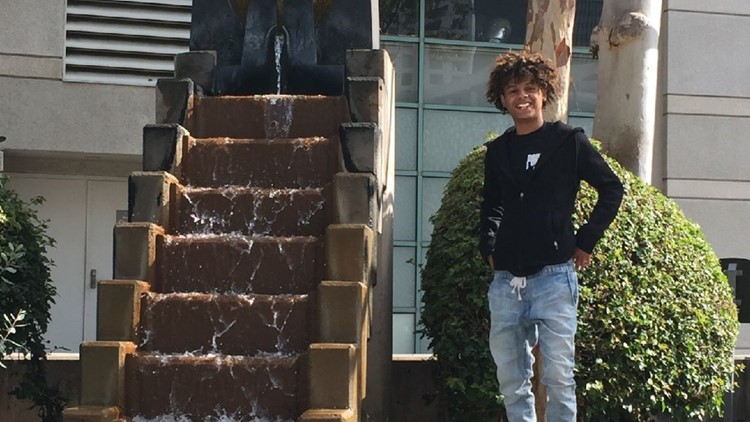SAN ANTONIO — Three years of covering a case where a San Antonio Police officer killed an unarmed man inside of a home should bring a swell of perspective, but the biggest revelation for me is the one I had at the beginning: There are no winners.
Following this case has not been a joy. It's an ongoing lesson. Pursuing the facts and facets of this shooting allows me to observe the actions of justice and community for this case.
Let's take a step back to see what we've learned from Charles 'Chop' Roundtree Jr.'s death and, more recently, what I read in depositions from key players in the wrongful death lawsuit filed by Roundtree's family.
On October 17, 2018, a couple flagged down SAPD Officer Steve Casanova to investigate an assault claim. The Central Patrol policeman had been watching 217 Roberts Street. According to the department, the home was a hot spot for police response.
I verified 130 calls of service from SAPD to that home in two years. Sixty-four of those responses involved drugs. But that morning, a drug call did not bring the police to that home.
After 1 a.m., the woman mentioned above explained to officers that someone didn't want them parking in front of a home as they filled an order for soup.
Casanova took details, which included that the attacker was a bald-head Black guy. The officer told the woman he'd investigate the call.
He took officers with him to 217 Roberts Street, including James Panah and Alexander Garza.
Details of the shooting
As Casanova entered the yard, he asked a man sitting on the porch to lift his cap. The man complied. The officer said on body camera video that he recognized the man but never asked about the assault he came to investigate.
Body camera video shows Casanova knocking on one of two front doors. The second one he hit and pushed open, the video shows.
Inside the living room were DaVante Snowden, Taylor Singleton and Charles Roundtree.
"What's up?" Casanova asked as his flashlight beamed into the door.
Snowden reacted with an expletive, grabbing his waistband as he stood up.
Casanova demanded to see Snowden's hand. Seconds later, Casanova fired two rounds into the home. The officers retreated.
In short, SAPD surrounded the property, gained control of an uncertain situation, and walked every occupant inside of the house out except one. Police said Roundtree was struck by one of Casanova's bullets and died.
Shooting aftermath
The officer was cleared of criminal responsibility by a Bexar County Grand Jury.
Snowden was arrested, indicted and acquitted on a charge of a felon possessing a weapon.
But what about Roundtree? At this point, he's paid the highest price.
The problem is, everyone sees it from their side: the police, the family, the activists, those who support the police. Beyond that, a resolution is fleeting.
Not that a settlement could not occur, but if the City of San Antonio were interested in settling this, they would have said, "Here's your check -- we're sorry." Instead, they continue to drag the family of a dead unarmed man through legal thistles. It's their job, I suppose.
Snowden and Singleton said they watched the 18-year-old drown in his blood. Roundtree's only sin was being inside a villainous home. It disqualified him from the sympathy factor of the general public.
Tragedy's other face is crimefighter Casanova. He is doing the job authorized by the taxpayers. In some circles, the officer gets labeled a murderer. Others believe he did what he needed to do to go home to his family.
The incident will follow him for the rest of his life. It can't be easy walking around with that cloud, even with the support of your police chief and family in blue.
He went looking for an assault suspect and walked away with one of the greatest trials of his life.
Being back on the beat must have been an adjustment. The very thought of something triggering the emotions from that night has to be formidable.
Then, to have the situation play out in the media escalates the weight for an officer relatively at the beginning of his career.
Again, there are no winners. Three years later, no activism, profound pontification, reform, allies -- nothing changes the situation.
Reviewing the depositions
Recently, I read through 675 pages of depositions from the case where Officer Casanova, Police Chief William McManus and others were deposed for the wrongful death lawsuit filed by Roundtree's family in 2018. It took a couple of weeks to complete, but I wanted as much context as the court-sanctioned Q&A provided.
The morning of the shooting, Casanova did not identify himself as a San Antonio police officer. Given a little more time, he said, "I would have been able to have a little bit further time to state it. But my presence alone -- which the uniform I'm wearing now -- I think that is clear enough that I'm a San Antonio Police."
The officer said he was acting to protect himself and his partners. That's the part our reporting has never questioned---if he feared for his life. We can't say what he did or did not see. Legal experts say it is nearly impossible to prove an officer did not fear for their life.
In this case, police found a gun outside the Roberts Street home. They believed Snowden tossed it out of a window.
An analysis of the weapon could not find Snowden's DNA on the gun even though police maintain he had one. A criminal court jury did not believe the authorities because they acquitted Snowden.
Detective Ruben Perez, who is listed as the lead case detective in the depositions, made an admission surprising to an outsider like me. He said the Bexar County District Attorney never called him to testify.
We wanted to know why. An inquiry to the DA's office came back with the following:
"By law, Grand Jury proceedings are secret. Therefore, we cannot comment on this matter."
In the depositions, McManus said Casanova was justified for shooting Snowden but not Roundtree. Here's an excerpt:
Roundtree attorney: And if an officer injures or kills an innocent third party, who's responsible for that third party's death?
Chief McManus: Officer Casanova.
Same shooting, right? I asked City Attorney Andy Segovia to explain. He sent me this statement:
"The facts are clear. This was a justified shooting with unintended consequences. To the point of Chief McManus' deposition – directing lethal force on Mr. Roundtree would not be justified. However, that's not what happened. The officer shot DaVante Snowden after he saw Snowden reach for a firearm in his waistband. The bullet intended for Mr. Snowden struck Mr. Roundtree. The Chief confirms several times in the deposition that he believes the use of lethal force against Mr. Snowden was justified. Taking deposition testimony out of context only serves to misinform the public."
We understand the shooting and its layers. But does unintended consequences mean wrongful? If the justified shooting comes with unintended consequences, who bears the responsibility? And, what does that look like? That brings us back to today with no resolution in sight.
There are no sides for me because there are no winners. No one has the sad right to take a victory lap. I do know that both sides acknowledge a deadly mistake got made.
My final question is, should Roundtree's epitaph read, "Here lies Charles Roundtree Jr, an unresolved mistake in San Antonio's history books?"



